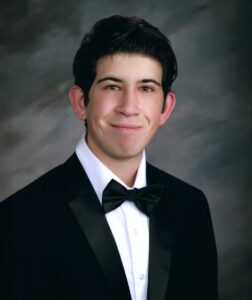Loose Change
You must know by now that your past experiences shaped you into who you are today. You graduated high school. At some point, you found the freedom of driving your own car. You moved out of your hometown and started a new life free from the bad memories of the past. Memories of parents splitting, your life being reshaped, losing friendships. Memories like that November night you didn’t go to Walmart.
As you climbed into Blake’s mom’s SUV you were so excited to go there. You finally would have a new pocket charger for power outages. You could get that special flavor of chips that stores walkable from your place didn’t offer. Jeffery had the idea to go to Walmart. It would have been the perfect night for it. But you weren’t even going close to there. You realized this a bit after Blake broke the engine-filled silence.
“Did you get the tools, Jeff?”
Jeffery produced a pair of bolt cutters and a small crowbar from his bag in response. “Hell yeah brother! It’s finally time.”
The event you were sure was going to follow wasn’t entirely new to you. When you first met Jeffery you both went to a private Christian school in the eighth grade. He tried giving you the idea that since your caregivers sheltered you so much you could get away with anything. You two snuck out plenty of times at his parents’ house during sleepovers. You would ring the neighborhood’s doorbells and leave oranges on their mats, imagining their reactions as you ran to hide. Eventually, you thought this type of attitude was okay. How could it not be when it was so exhilarating? You had met Blake once or twice before. He and Jeffery liked to make elaborate plans and play them out like they were hardened ninja-criminals.
“Time for what?”, you ask. You didn’t want any part of this. At this point you were too far from home to be dropped off and walk back.
“Blake and I have been eyeing this warehouse. We think it’s been completely abandoned; we never see any cars parked outside of it. It looks like it used to be a mechanic shop so we’re looking to score something cool,” replied Jeffery without remorse, “Sorry, I should have let you know we were doing this.”
From there you decided to stay quiet and try riding this one out. In the years you’ve known Jeffery he built an insane fixation on cars, trucks, basically anything with wheels that one could mod enough to “turn heads”. Blake shared this same love. An old mechanic’s shop was where they needed to be. They would get tools for free without a statement on Jeff’s Grandma’s credit card. This had been an issue for them before. They surely didn’t want that to happen again. Plus, Jeffery had now gained quite the experience in thievery. For him it was almost natural. It was something one in their right mind was meant to do.
When you arrived, you could see many other warehouses lit by moonlight. No other signs of human activity were seen. It was around one in the morning. The air around you felt cold as you stepped out of the heated car. Jeffery handed you one of the tools and even that had an ice-like chill. You thought back to a time when you were watching a show about ghost encounters with another friend of yours. The host said there always seemed to be a noticeable drop in temperature when spirits were around. The ghosts of mechanic’s past must have been surrounding you on that hill, trying to signal you to do anything but disrupt their territory.
You felt petrified in fear when you stood and watched your friends struggle with busting the lock to the warehouse’s entrance door. You stood there, crowbar in hand, initially suppressed to the fact that they were trying to get your attention.
“Hey,” Jeffery said as he shined his flashlight directly in your face, exposing you to whatever eyes, electronic, ghastly, or human, could have seen you in that dark night. “If you’re not gonna do anything, can you at least hand me the crowbar? You can keep watch out here if you don’t want to come in.”
Reluctantly, you did as he said. You then receded back to your frozen position and waited a few minutes after the halo of their phone lights faded away. You were certain the cops would come. The exact second you’d hear sirens you would run as fast as you could up the adjacent hill. They would never find you in such a desolate wasteland of forgotten private property. But the sirens never sounded. The darkness remained unchanged by alarming lights. You were okay. You decided you’d all be fine. You then went in, curious to see what they were finding.
You were met with an immensely open room lit by one small bulb. Jeff and Blake must have flipped a switch when they broke in. Monotone colored desks were arranged around the center of the room. Scattered documents and parts were strewn across them. An old RV sat in the back-middle of the garage. It had been jacked onto stilts. You saw that each of the wheels had been taken off and the parts of the axel that had made ergonomic travel possible were showing rust. Webs fell from the undercarriage of the mobile home as a skirt would from a royal princess. Her prince must have taken her apart and sold the parts of her away that he still thought valuable.
You jumped when hearing a loud clatter of tools coming from the room parallel to this one. It must have been where the others were. You knew then that you would never be like them, prowling through the belongings of others to find some piece for your loosely afforded puzzle. You would work for what you wanted. There must be a way to thrive without the need for crime.
You followed the noise into the room they were digging through. It was the big man’s office, the general of motors, the mason of mechanics, the father of all fixes.
“Air tools! I found air tools man! We gotta take these.” You had never heard Blake so excited. He had seemed constantly sedated in situations beforehand.
“Alright, cool! I found a sweet ratchet set I want too. This must have been like $300 new. Maybe I could even resell it,” Jeffery then turned to you with a ridiculous smile on his face, “Manny, why haven’t you grabbed anything? Don’t be lame, all this stuff is forgotten about anyways.”
“Nothing really matters to me here though, Jeff. Don’t you think they’ll come back for it someday?” You say this to him in truth, you didn’t care about tools or cars, you were close to seventeen and didn’t even have a license. You didn’t end up getting one anytime soon either.
Jeffery stared at you with a look of confusion you had only seen in your father when you told him your life’s career would involve video games, “Just look around. You’ll find something.”
So, you did look around. After all it was an office, maybe you could find something in there to use. You walk up to what must have been the boss’s desk. Documents were neatly organized into a miniature shelf on the left side. To the right of those was a stack of empty clipboards, followed by empty space, then finally a small cylindrical tin with an inch long slit in the lid.
Around its cylindrical form were repetitions of fantasy-like pictures, one of a chicken with an apron full of easter eggs, another with a white rabbit playing an egg-colored drum, another with a girl petting her bunny, and the top one showing three more white rabbits coming out of a bed of grass. It must have been bought during Easter, a holiday that you remember to be full of church sermons and violent egg hunts. You were the one who would go straight for the egg that looked different than the others. You knew that egg always had to be the one with the money.
You picked up the tin and realized that it held weight. Giving the thin metal a shake, you heard coins, and looked up to see Blake and Jeff standing in awe at what you had found. Their smiles had morphed into wonderous expressions. You had found the one thing more valuable than any free air tool or ratchet set. This treasure could be whatever you wanted it to.
You wanted this feeling to last forever, but as the three of you tried to find more money you were abruptly stopped by a set of red lights you failed to notice before. It was an LED alarm clock with the time and date set exactly. Clocks had to be reset all the time because of county-wide power loss. The ghost who had told you to leave before were remnants of the people who had still worked there daily. You rushed the news to Blake and Jeffery, who processed it in a flash. You all were gone within two minutes. It took a few moments after the surge of escape-induced adrenaline dispersed that you realized you still had the tin.
* * *
As years pass, you continue filling the tin with loose change you got from the rare times you use cash. It floats around the various surfaces of your room. Sometimes it sits on top of your dresser. Here it catches rays of sunlight that give it an amber glow at dusk. When you close the drawer after grabbing your jeans it will frequently fall and cause a loud rattle as it hits your bedroom floor. You’d then move it to your desk, where it will get caught on your mouse while you take your anger out on video games or difficult homework assignments.
You continue changing but the tin stays the same, frozen in time as if the magic of Easter never ends for it. The bunnies sit still in silence watching you try and find your own eggs. They look at you in shame. You took them from their home, snatched them from the existence they were meant to endure. Your coins were not meant for their vessel.
Though for some reason you see it as the imposter. Every time you add change a sense of clarity that your stash is growing washes over you, but you are quickly left with the pain of knowing you can’t let the tin go. It sits within your belongings as a scar you can afford to remove. You are afraid of the pain you might feel when it’s finally gone.
You wonder what memories it held before. You wonder more about the moments you took from the mechanic that would have happened if you had just let it be. Perhaps the mechanic was saving for the coming holidays. What could have been a few ice-creams for his grandchildren was a bag of Doritos and some Hostess cakes for you. Did that junk food form a meaningful bond? Did those scratchers you spent months of change on give you any benefit?
At one moment you’re working back in the place where this all started. Yards away from where you got in the car and didn’t go to Walmart. You’re bussing tables for a summer gig, trying to save up money for your move.
That restaurant had become like a recital to you in the years you’ve worked there. You bus the tables like performing a synchronized dance. Every pattern stays fixed in your muscle memory, wiping the table with an elegant curtsy, carrying trays of drinks as if they were a ballerina twirling on your fingertips. You moved to the Spanish music fluently, not fueled by words you didn’t know but by the passion the artists had when recording their songs. Your coworkers sometimes call you robotic in the way that you process and complete tasks in rapid succession. Now you see Jeffery there at table eleven, sitting in the same spot where you’ve hid from your boss’ cameras to roll silverware at your own pace. Seeing him caused an error to appear in your choreography.
He looks older now, more mature, more like the truck he drove to the restaurant in was from his own money that he worked hard for. At first, he doesn’t recognize you. You make yourself known when asking if the table needs refills. You were excited about seeing him, but he looked to you as if he were hiding from the shameful misadventures you had before. You don’t remember much of the small conversation you two had. But you do remember the last line of advice he gave.
“Keep your head on straight, bud.”
It felt as if he took your face in both of his hands and spit directly in your eyes. You never saw him after this. You still hope it stays that way.
Eventually you’ll forget about Jeffery, or Blake, or even the tin as it sits in your storage unit when you’re twenty years older than you are now. You’ll grow into a full career with more important things to worry about than Easter or power outages. Maybe you’ll even get your own mobile home and treat it like royalty as you travel the kingdom with your family. Later your own children will go through adolescence, finding their own Jefferys and Blakes and tins that you may not ever learn about.
As you meet your death your belongings in that storage unit will be auctioned off to the head mechanic’s grandkid. They would be so excited when looking through your forgotten loot to recognize their Papa’s coin tin. They’ll wonder how it got there, and if maybe their grandfather would have liked to see it again before he too had passed. Now they’ll learn that for most of their life, and until you could no longer exist enough to help it, you held on to that tin.
Emmanuel Loomis is an English major at California State University Chico, active in the writing of both personal and academic work. He strives to create worlds that give a sense of escape while commenting on themes that deserve more attention. Emmanuel has before been published in Butte College’s student newspaper with his poem “Ode to Meat” and is currently working on a composite novel of fictional stories titled Siblings, Friends, and Those Who Need Them. He stays active in campus activities and enjoys the feeling of being around friends, family, and people who cherish writing as a creative expression.




